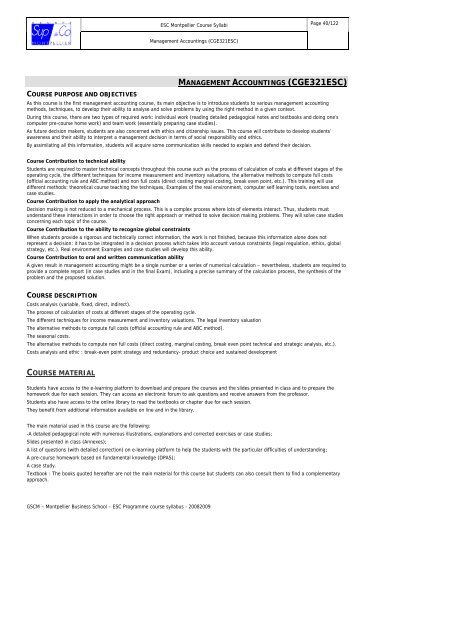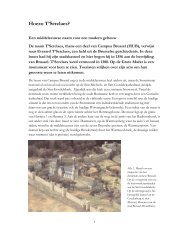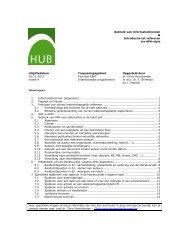esc montpellier course syllabi groupe sup de co ... - HUBRUSSEL.net
esc montpellier course syllabi groupe sup de co ... - HUBRUSSEL.net
esc montpellier course syllabi groupe sup de co ... - HUBRUSSEL.net
You also want an ePaper? Increase the reach of your titles
YUMPU automatically turns print PDFs into web optimized ePapers that Google loves.
COURSE PURPOSE AND OBJECTIVES<br />
ESC Montpellier Course Syllabi<br />
Management Ac<strong>co</strong>untings (CGE321ESC)<br />
GSCM – Montpellier Business School – ESC Programme <strong><strong>co</strong>urse</strong> syllabus - 20082009<br />
Page 40/122<br />
MANAGEMENT ACCOUNTINGS (CGE321ESC)<br />
As this <strong><strong>co</strong>urse</strong> is the first management ac<strong>co</strong>unting <strong><strong>co</strong>urse</strong>, its main objective is to introduce stu<strong>de</strong>nts to various management ac<strong>co</strong>unting<br />
methods, techniques, to <strong>de</strong>velop their ability to analyse and solve problems by using the right method in a given <strong>co</strong>ntext.<br />
During this <strong><strong>co</strong>urse</strong>, there are two types of required work: individual work (reading <strong>de</strong>tailed pedagogical notes and textbooks and doing one’s<br />
<strong>co</strong>mputer pre-<strong><strong>co</strong>urse</strong> home work) and team work (essentially preparing case studies).<br />
As future <strong>de</strong>cision makers, stu<strong>de</strong>nts are also <strong>co</strong>ncerned with ethics and citizenship issues. This <strong><strong>co</strong>urse</strong> will <strong>co</strong>ntribute to <strong>de</strong>velop stu<strong>de</strong>nts’<br />
awareness and their ability to interpret a management <strong>de</strong>cision in terms of social responsibility and ethics.<br />
By assimilating all this information, stu<strong>de</strong>nts will acquire some <strong>co</strong>mmunication skills nee<strong>de</strong>d to explain and <strong>de</strong>fend their <strong>de</strong>cision.<br />
Course Contribution to technical ability<br />
Stu<strong>de</strong>nts are required to master technical <strong>co</strong>ncepts throughout this <strong><strong>co</strong>urse</strong> such as the process of calculation of <strong>co</strong>sts at different stages of the<br />
operating cycle, the different techniques for in<strong>co</strong>me measurement and inventory valuations, the alternative methods to <strong>co</strong>mpute full <strong>co</strong>sts<br />
(official ac<strong>co</strong>unting rule and ABC method) and non full <strong>co</strong>sts (direct <strong>co</strong>sting marginal <strong>co</strong>sting, break even point, etc.). This training will use<br />
different methods: theoretical <strong><strong>co</strong>urse</strong> teaching the techniques, Examples of the real environment, <strong>co</strong>mputer self learning tools, exercises and<br />
case studies.<br />
Course Contribution to apply the analytical approach<br />
Decision making is not reduced to a mechanical process. This is a <strong>co</strong>mplex process where lots of elements interact. Thus, stu<strong>de</strong>nts must<br />
un<strong>de</strong>rstand these interactions in or<strong>de</strong>r to choose the right approach or method to solve <strong>de</strong>cision making problems. They will solve case studies<br />
<strong>co</strong>ncerning each topic of the <strong><strong>co</strong>urse</strong>.<br />
Course Contribution to the ability to re<strong>co</strong>gnize global <strong>co</strong>nstraints<br />
When stu<strong>de</strong>nts provi<strong>de</strong> a rigorous and technically <strong>co</strong>rrect information, the work is not finished, because this information alone does not<br />
represent a <strong>de</strong>cision: it has to be integrated in a <strong>de</strong>cision process which takes into ac<strong>co</strong>unt various <strong>co</strong>nstraints (legal regulation, ethics, global<br />
strategy, etc.). Real environment Examples and case studies will <strong>de</strong>velop this ability.<br />
Course Contribution to oral and written <strong>co</strong>mmunication ability<br />
A given result in management ac<strong>co</strong>unting might be a single number or a series of numerical calculation – nevertheless, stu<strong>de</strong>nts are required to<br />
provi<strong>de</strong> a <strong>co</strong>mplete report (in case studies and in the final Exam), including a precise summary of the calculation process, the synthesis of the<br />
problem and the proposed solution.<br />
COURSE DESCRIPTION<br />
Costs analysis (variable, fixed, direct, indirect).<br />
The process of calculation of <strong>co</strong>sts at different stages of the operating cycle.<br />
The different techniques for in<strong>co</strong>me measurement and inventory valuations. The legal inventory valuation<br />
The alternative methods to <strong>co</strong>mpute full <strong>co</strong>sts (official ac<strong>co</strong>unting rule and ABC method).<br />
The seasonal <strong>co</strong>sts.<br />
The alternative methods to <strong>co</strong>mpute non full <strong>co</strong>sts (direct <strong>co</strong>sting, marginal <strong>co</strong>sting, break even point technical and strategic analysis, etc.).<br />
Costs analysis and ethic : break-even point strategy and redundancy- product choice and sustained <strong>de</strong>velopment<br />
COURSE MATERIAL<br />
Stu<strong>de</strong>nts have access to the e-learning platform to download and prepare the <strong><strong>co</strong>urse</strong>s and the sli<strong>de</strong>s presented in class and to prepare the<br />
homework due for each session. They can access an electronic forum to ask questions and receive answers from the professor.<br />
Stu<strong>de</strong>nts also have access to the online library to read the textbooks or chapter due for each session.<br />
They benefit from additional information available on line and in the library.<br />
The main material used in this <strong><strong>co</strong>urse</strong> are the following:<br />
-A <strong>de</strong>tailed pedagogical note with numerous illustrations, explanations and <strong>co</strong>rrected exercises or case studies;<br />
Sli<strong>de</strong>s presented in class (Annexes);<br />
A list of questions (with <strong>de</strong>tailed <strong>co</strong>rrection) on e-learning platform to help the stu<strong>de</strong>nts with the particular difficulties of un<strong>de</strong>rstanding;<br />
A pre-<strong><strong>co</strong>urse</strong> homework based on fundamental knowledge (DPAS);<br />
A case study.<br />
Textbook : The books quoted hereafter are not the main material for this <strong><strong>co</strong>urse</strong> but stu<strong>de</strong>nts can also <strong>co</strong>nsult them to find a <strong>co</strong>mplementary<br />
approach.




